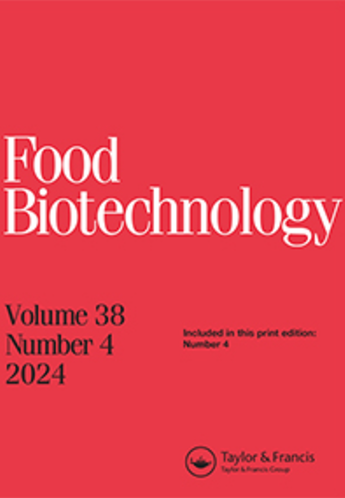Selection of indigenous Lacticaseibacillus paracasei CD 4 for production of gluten-free traditional fermented product Bhaturu
IF 1.6
4区 农林科学
Q4 BIOTECHNOLOGY & APPLIED MICROBIOLOGY
引用次数: 1
Abstract
ABSTRACT Celiac disease is an autoimmune disorder triggered by immune-toxic peptides generated through incomplete hydrolysis of wheat gluten. This study reports the screening of potential probiotic strains to hydrolyze wheat gluten. The selected strain was used in the production of gluten-free traditional fermented and fried bread, Bhaturu. Lacticaseibacillus paracasei CD4 and Limosilactobacillus gastricus BTM7 produced halo zones on gluten containing agar plates. Lc. paracasei CD4 resulted in 2.3 folds higher free amino acid content in gluten-based medium. The SDS-PAGE analysis indicated that gluten was degraded into high and low molecular weight peptides. The fermentation of wheat flour was conducted with 7.0 log CFU/g of Lc. paracasei CD4 for 24 h. A fermentation time of 12 h was selected based on higher viable cell count, ammoniacal-nitrogen, and titratable acidity. The fermentation resulted in decrease in albumin, glutenin and gliadin contents (P > .05). The Bhaturu prepared from fermented dough had higher acceptability based on sensory evaluation.国产副干酪乳杆菌CD4生产无麸质传统发酵产品Bhaturu的筛选
摘要乳糜泻是一种由小麦面筋不完全水解产生的免疫毒性肽引发的自身免疫性疾病。本研究报道了水解小麦面筋的潜在益生菌菌株的筛选。选择的菌株用于生产无麸质的传统发酵和油炸面包Bhaturu。副干酪乳杆菌CD4和胃乳杆菌BTM7在含麸质琼脂平板上产生晕带。在基于面筋的培养基中,副酪蛋白CD4导致2.3倍的游离氨基酸含量增加。SDS-PAGE分析表明,面筋被降解为高分子量肽和低分子量肽。小麦粉的发酵用7.0 log CFU/g的副酪蛋白CD4进行24小时。基于较高的活细胞计数、氨氮和可滴定酸度选择12小时的发酵时间。发酵导致白蛋白、谷蛋白和醇溶蛋白含量下降(P>0.05)。从感官评价来看,发酵面团制备的Bhaturu具有较高的可接受性。
本文章由计算机程序翻译,如有差异,请以英文原文为准。
求助全文
约1分钟内获得全文
求助全文
来源期刊

Food Biotechnology
工程技术-生物工程与应用微生物
CiteScore
3.80
自引率
0.00%
发文量
15
审稿时长
>12 weeks
期刊介绍:
Food Biotechnology is an international, peer-reviewed journal that is focused on current and emerging developments and applications of modern genetics, enzymatic, metabolic and systems-based biochemical processes in food and food-related biological systems. The goal is to help produce and improve foods, food ingredients, and functional foods at the processing stage and beyond agricultural production.
Other areas of strong interest are microbial and fermentation-based metabolic processing to improve foods, food microbiomes for health, metabolic basis for food ingredients with health benefits, molecular and metabolic approaches to functional foods, and biochemical processes for food waste remediation. In addition, articles addressing the topics of modern molecular, metabolic and biochemical approaches to improving food safety and quality are also published.
Researchers in agriculture, food science and nutrition, including food and biotechnology consultants around the world will benefit from the research published in Food Biotechnology. The published research and reviews can be utilized to further educational and research programs and may also be applied to food quality and value added processing challenges, which are continuously evolving and expanding based upon the peer reviewed research conducted and published in the journal.
 求助内容:
求助内容: 应助结果提醒方式:
应助结果提醒方式:


